O método na ciência do direito
DOI:
https://doi.org/10.30612/videre.v9i18.6811Palavras-chave:
Norberto Bobbio. Método. Metodologia. Teoria do direito. Linguagem jurídica.Resumo
Uma das mais importantes contribuições de Norberto Bobbio para a teoria do direito corresponde às ideias que ele desenvolveu a propósito do método da ciência do direito e do método da interpretação jurídica. A fecundidade lógica de suas ideias nessa área conduziram à formação de uma das escolas do pensamento jurídico mais influentes na Europa e na América Latina. Neste artigo, analisamos as principais contribuições de Bobbio para esse tema e mostramos por que suas contribuições atravessaram décadas e crises e continuam pertinentes e úteis.Downloads
Não há dados estatísticos.
Downloads
Publicado
2017-12-19
Como Citar
Estevam, A. L. (2017). O método na ciência do direito. Revista Videre, 9(18), 13–22. https://doi.org/10.30612/videre.v9i18.6811
Edição
Seção
Artigos
Licença
Os autores devem aceitar as normas de publicação ao submeterem a revista, bem como, concordam com os seguintes termos:
(a) O Conselho Editorial se reserva ao direito de efetuar, nos originais, alterações da Língua portuguesa para se manter o padrão culto da língua, respeitando, porém, o estilo dos autores.
(b) Autores mantém os direitos autorais e concedem à revista o direito de primeira publicação, com o trabalho simultaneamente licenciado sob a Atribuição-NãoComercial-CompartilhaIgual 3.0 Brasil (CC BY-NC-SA 3.0 BR) que permite: Compartilhar — copiar e redistribuir o material em qualquer suporte ou formato e Adaptar — remixar, transformar, e criar a partir do material. A CC BY-NC-SA 3.0 BR considera os termos seguintes:
- Atribuição — Você deve dar o crédito apropriado, prover um link para a licença e indicar se mudanças foram feitas. Você deve fazê-lo em qualquer circunstância razoável, mas de nenhuma maneira que sugira que o licenciante apoia você ou o seu uso.
- NãoComercial — Você não pode usar o material para fins comerciais.
- CompartilhaIgual — Se você remixar, transformar, ou criar a partir do material, tem de distribuir as suas contribuições sob a mesma licença que o original.
- Sem restrições adicionais — Você não pode aplicar termos jurídicos ou medidas de caráter tecnológico que restrinjam legalmente outros de fazerem algo que a licença permita.
(c) Após a publicação, os autores têm permissão e são estimulados a publicar e distribuir seu trabalho online – em repositórios institucionais, página pessoal, rede social ou demais sites de divulgação científica, desde que a publicação não tenha fins comerciais.



















